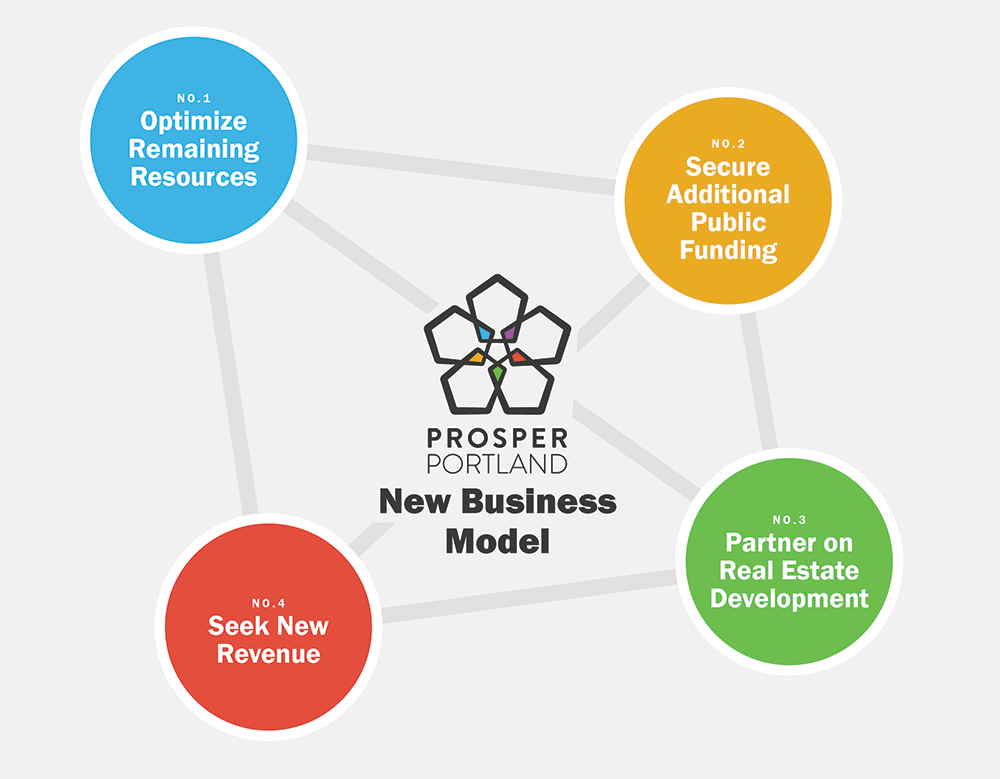The Financial Sustainability Plan
Despite a strong economy and a low unemployment rate, Portland faces persistent and growing economic disparities that emerge across geographic, racial and socio-economic lines. Portlanders of color are twice as likely to live beneath the poverty line as those who are white. Middle-wage job growth stagnates even as low-wage and high-wage jobs increase. Rising property values cause lower-income households to move further from the city’s core, often to neighborhoods lacking basic goods and services or access to employment.
While Prosper Portland’s 2020 Strategic Plan sets a course for fostering economic opportunity, its practices and funding must continue to evolve in alignment with its financial context and new strategic objectives. The agency’s primary funding tool, tax increment financing (TIF), will precipitously decline as urban renewal areas (URAs) around the city sunset over the next ten years. Moreover, given the human- and business-centered nature of these challenges, Prosper Portland must develop and apply a new suite of more flexible financial tools and programs.
Over the past five years, the agency’s
traded sector economic development work led to:
The Financial Sustainability Plan creates a framework to guide the agency’s financial and business practices from 2018 through 2027 in support of its strategic priorities. The Plan proposes a new, multipronged approach that could fund an annual operating budget of $30 million. Implemented in phases over the next ten years, the approach allows Prosper Portland to replace the amount of existing TIF resources used to support operations that otherwise will diminish as existing URAs expire. Furthermore, these more flexible resources are better suited to help Portland’s diverse businesses and residents thrive.
The Plan employs four revenue and operational components, which are identified in Figure 1. Through responsible stewardship of assets, revenue creation, identification of alternative funding sources and bold financial commitments from civic leaders, Prosper Portland can sustain its operations and continue its work to build an equitable economy for Portlanders.
As modeled, the Plan could fund delivery of programs and initiatives with the following outcomes over the next 14 years:
- 14,500 new jobs through cluster industry and business development programs;
- 19,300 workforce development participants (13,000 participants of color);
- $32.5 million in leveraged non-public resources and 442,000 volunteer hours supporting community partners; and
- Support for 4,700 businesses through the Inclusive Business Resource Network and Prosperity Investment Program grants.

Figure 1: Prosper Portland New Business Model
While the new business model sets forth an approach and framework, it fundamentally encourages flexibility and envisions significant “course corrections” over the forthcoming decade. Mindful of identified risks and opportunities, the Plan outlines key bodies of work necessary to implement the new approach. Over the ten-year life of the plan, Prosper Portland will need to continue to look for opportunities to control costs and balance public aspirations with finite staff capacity; to reshape investment programs, policies, and procedures to ensure transaction decisions are made in the context of the entire portfolio and highest community priorities; to streamline standards for loan activity while filling critical capital gaps; and to implement an updated Financial Investment Policy, which includes limiting grants and infrastructure expenditures; and to pursue, secure and deliver on new capital and operating funds.
With an era of transformative growth for Portland on the horizon, the components of the Financial Sustainability Plan position Prosper Portland to create economic growth and opportunity with private and non-profit partners on behalf of the City of Portland.
